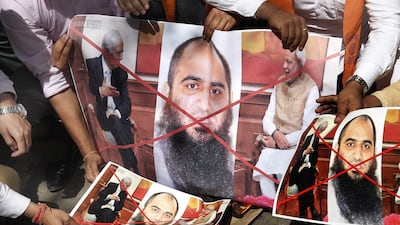NEW DELHI // Less than a week after the symbolic embrace between prime minister Narendra Modi and the newly sworn-in chief minister of Jammu and Kashmir, the first cracks in the uneasy ruling coalition have appeared.
Mufti Mohammed Sayeed, the leader of the People’s Democratic Party (PDP), freed separatist leader Masarat Alam from prison on Saturday as part of his campaign promise to release political prisoners held without being formally charged.
Mr Alam’s release has angered the PDP’s coalition partner, the Bharatiya Janata Party (BJP).
The prime minister, who also leads the BJP, called the move “unacceptable” and “anti-national”.
“I assure the country and the house that whatever is happening there [in Jammu and Kashmir], the [federal] government was neither consulted nor informed,” Mr Modi said in parliament on Monday after an uproar over Mr Alam’s release.
According to media reports citing the Jammu and Kashmir government, Mr Sayeed is trying to release other separatists including Ashiq Faktoo, a former commander of the terrorist group Jamiat-ul-Mujahideen.
Faktoo has spent 22 years in prison after receiving a life sentence for the murder of a human-rights activist in 1992. He has appealed to the supreme court.
“In one voice, we express our anger against those supporting separatists and misusing the law,” Mr Modi said.
“In the coming days, we will take whatever action is required and we are committed to the nation’s integrity.”
In the Rajya Sabha, the upper house of parliament, an opposition Congress MP moved to suspend business for the day in protest. The motion was rejected but the house adjourned for the morning because of the uproar over the issue.
Mr Alam, the head of the Muslim League party, was arrested in 2010 for organising protests to demand Kashmiri independence from India in which more than 110 people died in clashes with security forces.
He was arrested under the state’s public safety act, which allows people deemed a threat to security to be held for up to two years without trial.
Mr Alam remained in custody for four years because of six successive applications of the law. Each time before his detention ended, a new application was slapped on him and he had to remain in prison. He was never formally charged.
“What is the big deal in my release?” Mr Alam said after leaving prison. “I have been going in and coming out of jails for the last 20 years … I have not been done any favours by the government. My release is part of the judicial process.”
The election of the PDP, Mr Alam said, did not change the ground realities in the state or his pro-independence stance. “It does not affect the status of Jammu and Kashmir. Only the people can change it.”
Sushant Singh, a Mumbai-based analyst and a former army officer who served in Kashmir, said that in the early 1990s Mr Alam was a “borderline terrorist, before he launched his political party”.
“Even now, he is emphatically an anti-India organiser,” Mr Singh told The National. “He is the lynchpin of anything that happens in and around Srinagar, for example, protests, stone-pelting, things like that.”
Mr Alam is also likely to become the next head of the Hurriyat Conference, an influential alliance of 26 political parties and religious groups that stands for Kashmir’s right to self-determination, Mr Singh said.
On Twitter, Omar Abdullah, a former state chief minister whose government had first arrested Mr Alam, said that although his detention was not ideal, “difficult situations have to be tackled … It’s not a coincidence that the protests died out after his hard-won detention.”
Hindu nationalist groups allied to the BJP, who support a firm hand against separatism in Kashmir, have voiced outrage at Mr Alam’s release.
“Masarat Alam, who is responsible for the death of 120 youths in the [Kashmir] valley, who instigates youth to throw stones on our security forces, must be re-arrested immediately,” Pravin Togadia, the president of the Vishwa Hindu Parishad, said on Sunday.
Mr Singh believes Mr Sayeed is trying to appease his core constituency – the Muslims who make up two-thirds of Jammu and Kashmir’s population and view the BJP with disfavour.
“Sayeed has to prove himself to his voters, and he knows the BJP won’t leave the government,” Mr Singh said. “And in case it does, Sayeed can play the martyr. He can call for another election, and he can go back to his voters and say: ‘I sacrificed power for the sake of you all. Elect me back into power.’”
ssubramanian@thenational.ae

